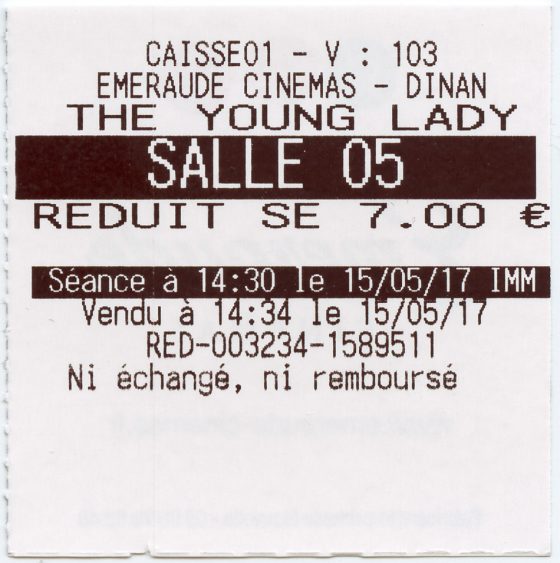Lady Macbeth

Webster’s Dictionary Defines A Book Report As…
You’re taking a risk when you appropriate, riff or (shudder) update Shakespeare. The effect of Lady Macbeth was mostly baffling. In a very unusual case, the french title – The Young Lady (and no, it’s not ‘La Femme Jeune’, it’s in English like all good mistranslated titles must be) is significantly more apt than the English. This is largely because the film has nothing, and let me clear when I say nothing
nothing
to do with the eponymous material. It practically demands an eighth grade compare and contrast essay. Here is it, with lots of swears just as Father McDougherty dreamed I’d get to do one day.

Guilt
There’s some speech about a fork in the original, who can remember. But in our case we wait, oh how we wait, for Ms. Florence Pugh to visualize cutlery. Instead, this is Lady Macbeth without the acumen or the unexpected conscience. It is a version of what has been done much, much better before: The Evil Guy That Gets Away With It Film.
The secret to enjoying those films, however is…
Cunning
As with some favorites of mine, The Rise and Rise of Michael Wimmer, Election, Nightcrawler and even the significantly less successful but way better than this overpraised piece of shit Kill Your Friends, there is pleasure one gets in the way that the nasty lead gets away with it. The little tricks, the insights into what the weak can be tricked to do, these films are good, and more importantly, fun stuff. There’s probably another female character in something else that got to do all that stuff. Who can remember?
In the film, however, the first murder is poisoning the father in law. Ms. Pugh locks him in adjacent room, in order to…not get away with it? If she had just let him die, it would have been the wrong mushrooms, she’d never be suspected. Instead, this action serves exactly to prove to the other character that she knowingly did it.
It is, unfortunately, only the basecamp to the apex of stupid, as it transpires that Ms. Naomi Ackie – the maid who witnessed it – decides to go mute upon seeing that violence is bad. Whew. That was lucky…that no one who greenlit the script has the slightest sense of story mechanics. And there were so many companies: BBC, BFI and the ever so ironic that I already knew what I was getting into Creative England.
Ah. Our era. Everything is fine now because women choose to give away their power.
Sigh. Am I the only one that saw Jade, the film in which they kept saying ‘hysterical blindness’, over and over and over, as if by incantation they could make the movie plausible? See bad movies. It’s the only way you learn. It’s like we want to be great chefs without knowing that the stove gets hot. The secret? You already are a great chef! Good for you!
With our Young Lady, the second murder is unplanned, not unlike the now seemingly not terrible Iris. What does this mean, besides having nothing to do with the original? Well…
Feminism
Ah. Our era. Everything is fine now because women choose to give away their power.
Thing about the original Lady Macbeth, she was not screwing around. She was no slouch when it came to manipulation and sheer fucking will. In this version, Ms. Pugh falls into murder instead of just being good it it, taking away any hope of simple agency.
More importantly, Lady Macbeth craved power with no apology. Everyone wants power, as Mr. Danny DeVito might say, that’s why they call it power. In our updated version…
Justification

On the other hand, I didn’t have to see Bateau Ivre, just the unfortunate trailer. A film that features such scenes as ‘They’re fighting!’ and ‘They’re making up’ and ‘He’s in the hospital!’ The French only make art films now. And I’ve had my fill.
As of late, any outsider character must have a past or a reason to do what they want. This is so we’ll feel sympathetic, instead of just being good at your job and writing the film so we will. I believe this is what I call De-Sabatier, the idea that the character doing anything outside the norm must be explained as childhood trauma or history, thus bringing them into the norm and out of the fun.
We are treated to various scenes of Ms. Pugh being bored and not being allowed to go outside. This wasn’t so terrible. The idea of boundaries (that she wasn’t allowed to leave the house) and when given the freedom that she would be caught or punished or free is basic story mechanics. The fact that the writers didn’t understand the importance of causality and escalation that might arise from choice is merely depressing. Right, that reminds me…
Writing
Shakespeare had a kind of crystalline density, more in a single pentameter than the rest of us get in our entire lives. When it comes to guilt: ‘Every time I close my eyes I see his face’, well, it ain’t exactly some writer. Who can remember?
Shitty plot devices
This is the thing you steal from Shakespeare? Though surprisingly bereft of twins, costume changes, and poisoning that brings you back to life, the film does contain hysterical muteness, previously mentioned.
For Mr. William Goldman, coincidence is fine, as long as it doesn’t affect the plot. That is, make her go mute, but don’t have entire story points, including the end where Ms. Ackie is put to death for Ms. Pugh’s crime, revolve entirely around them.
Or, actually, do. Because Mr. Goldman, while entirely correct, is also wrong. Shakespeare is the shitty plot device king. We don’t notice it because he used things like people walking down into sinister basements (I’m making him the author of People Under the Stairs now) as an opportunity to simply opine about mortality, desire, and self-sabotage. This film’s insight – and Mr. Mike Leigh has a lot to answer for – is more of the ‘People sure do stuff, huh?’ variety.
And then there’s the lack of poetry. Having seen both A Quiet Passion and I Am Not Your Negro in the space of the few last weeks, it is hard not be conscious of people who understood how to string words together, people who made you weep just by pushing breath against their throats. Watching I Am Not Your Negro, I felt blind. Phrases like ‘grotesque appeals to innocence’ and ‘why the lives we lead on this continent are mainly so empty, so tame, and so ugly’ drain the blood from your eyes as your mind attempts to reconcile and process the contradiction and wonder.
We can gaze upon our dying language, and the shitty ‘I don’t know how to write just means I write like real people’ realism, that this is a film less written for our time than by it. We may look to the new world, or television, or the internet (ahem) for hope. But there’s always going to be shitty art, and shitty people to praise it.
And beautiful art, by the grace of the people who invisibly struggle to bring it to life. Shakespeare, without the folios, would have disappeared into the ether. We ask, when we see the VanGogh’s and the Dickinson’s and the Vivian Meyer’s: who are the others that we will never know and should?
The inverse must also be true: they who lack talent, frisson and insight, but are elevated enough to make us second-guess our own knowing better. But this film will out: Lady Macbeth won’t need obscurity to disappear.
The Take

-$4.00
The Lonely Comments Section

 [logo]
[logo]
